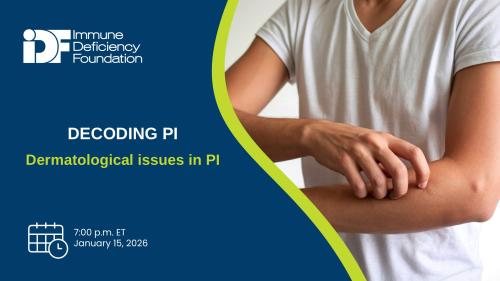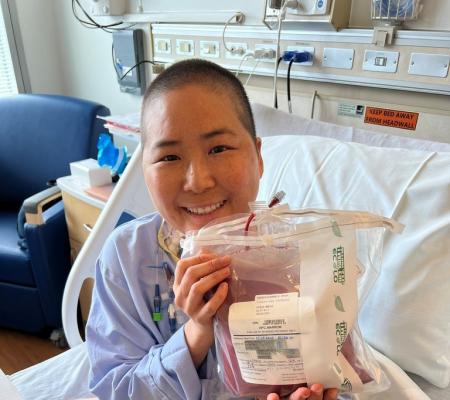
-
Understanding primary immunodeficiency (PI)

Understanding PI
The more you understand about primary immunodeficiency (PI), the better you can live with the disease or support others in your life with PI. Learn more about PI, including the various diagnoses and treatment options.
-
Living with PI
-
Addressing mental health
-
Explaining your diagnosis
- General care
- Get support
- For parents and guardians
-
Managing workplace issues
- Navigating insurance
-
Traveling safely

Living with PI
Living with primary immunodeficiency (PI) can be challenging, but you’re not alone—many people with PI lead full and active lives. With the right support and resources, you can, too.
-
Addressing mental health
-
Get involved

Get involved
Be a hero for those with PI. Change lives by promoting primary immunodeficiency (PI) awareness and taking action in your community through advocacy, donating, volunteering, or fundraising.
-
Advancing research and clinical care
-
Research Grant Program
-
Consulting immunologist
-
Diagnosing PI
-
Getting prior authorization
-
Clinician education
-
Survey research
-
Participating in clinical trials

Advancing research and clinical care
Whether you’re a clinician, researcher, or an individual with primary immunodeficiency (PI), IDF has resources to help you advance the field. Get details on surveys, grants, and clinical trials.
-
Research Grant Program
While recurrent infections are a hallmark of primary immunodeficiency (PI), some individuals with PI also cope with autoimmunity, a condition where the immune system mistakenly attacks different organ systems in the body.
“The reason why these immune deficiencies (can lead to) autoimmunity is oftentimes the genetic change that is responsible for causing these (conditions) is important in the process that regulates the immune response. When the regulation is off, the immune system gets confused and starts attacking different parts of the body. It doesn't know that it's not supposed to do that, and that's why autoimmunity can develop,” explained Dr. Alice Chan, a pediatric immunologist, rheumatologist, and allergist at the University of California San Francisco Benioff Children’s Hospital in an Immune Deficiency Foundation presentation on autoimmune issues and PI.
Autoimmune issues occur in both adults and children and most commonly in conjunction with the following PIs:
- Common variable immune deficiency (CVID).
- Chronic granulomatous disease (CGD).
- Wiskott-Aldrich syndrome (WAS).
- Primary immune regulatory disorders (PIRD).
A study of over 2,000 patients with CVID in the French National Primary Immunodeficiency Registry found that 26% had at least one autoimmune condition and that some people developed several autoimmune problems.
“This makes sense in the context that we know that a lot of these patients have genetic problems where the immune system is not being regulated correctly, so we would expect that there's potential for them to have multiple immune system issues going on,” said Chan.
The most common autoimmune issue associated with PI is autoimmune cytopenia, a condition in which immune cells attack the red blood cells, platelets, or neutrophils. The different types of autoimmune cytopenia include:
- Immune thrombocytopenia purpura (ITP), where the immune system attacks platelets, resulting in low platelet counts that cause easy bruising, spontaneous bloody noses, or prolonged bleeding.
- Autoimmune hemolytic anemia (AIHA), where the immune system attacks red blood cells, causing anemia and sometimes requiring blood transfusions.
- Evans syndrome, which is characterized by two or more cytopenias.
Doctors treat autoimmune cytopenia with steroids but also use medicine to dampen the immune system, such as high doses of immunoglobulin (Ig) treatment therapy, a drug called rituximab, which removes B cells (if they are doing the attacking), or sirolimus, an immune suppressant that prevents T cells from attacking the blood.
Gastrointestinal autoimmune issues are also common with PI and include:
- Celiac disease, in which the immune system makes an antibody that attacks gluten but also the gut.
- Inflammatory bowel diseases (IBD), like Crohn’s disease and ulcerative colitis, which affect the colon.
- Autoimmune enteropathy, where the immune system attacks the lining of the intestines.
- Autoimmune hepatitis, where the immune system attacks the liver.
Avoiding gluten, taking steroids, or using targeted monoclonal antibodies assist in controlling gastrointestinal autoimmune issues.
The immune system can also attack endocrine organs such as the thyroid, causing Hashimoto’s disease, or the pancreas, leading to type 1 diabetes. Doctors can treat endocrine problems by replacing missing hormones.
Autoimmunity in the lungs can lead to granulomatosis and lymphocytic interstitial lung disease (GLILD), which develops in 25% of patients with CVID, or interstitial lung disease (ILD), both of which cause severe breathing problems. Doctors use a host of drugs to treat these conditions, including steroids, rituximab to reduce B cells, and abatacept to control T cells. Other immunosuppressants such as azathioprine, mycophenolate, and mofetil may also be used to treat lung problems.
Other autoimmunities experienced by PI patients include rheumatological issues like arthritis and lupus, treated with steroids, monoclonal antibodies, and other immunosuppressants, and skin conditions for which doctors may prescribe ointments and immunosuppressants.
Chan said the more details providers can determine about the PI or the autoimmune issue through diagnostic testing, the more successful they will be in improving the health of patients.
“Treatment is targeted to the specific immune (variant). If we can identify the specific genetic cause or determine the type of disease that's involved, whether it be, for example, autoimmune cytopenias or arthritis, this can really help us pin down which therapy would be best to treat that disease or organ manifestation,” said Chan.
2026 PI Conference
Join us June 25-27, 2026, in San Antonio, Texas, for a transformative experience where stories connect, voices unite, and journeys inspire. No matter where you are in your primary immunodeficiency journey, access expert-led education, meaningful connections, and cutting-edge insights from world-renowned immunologists.
Register nowTopics
This page contains general medical and/or legal information that cannot be applied safely to any individual case. Medical and/or legal knowledge and practice can change rapidly. Therefore, this page should not be used as a substitute for professional medical and/or legal advice. Additionally, links to other resources and websites are shared for informational purposes only and should not be considered an endorsement by the Immune Deficiency Foundation.
Related resources
Sign up for updates from IDF
Receive news and helpful resources to your cell phone or inbox. You can change or cancel your subscription at any time.





The Immune Deficiency Foundation improves the diagnosis, treatment, and quality of life for every person affected by primary immunodeficiency.
We foster a community that is connected, engaged, and empowered through advocacy, education, and research.
Combined Charity Campaign | CFC# 66309




